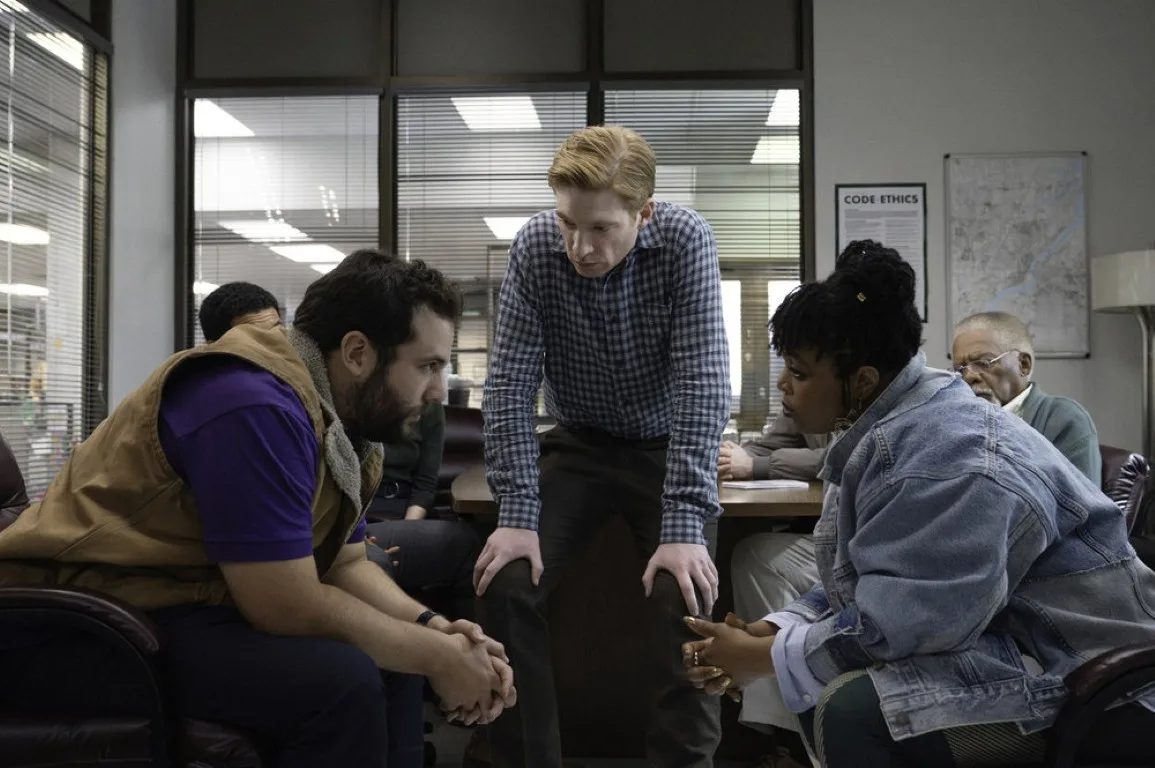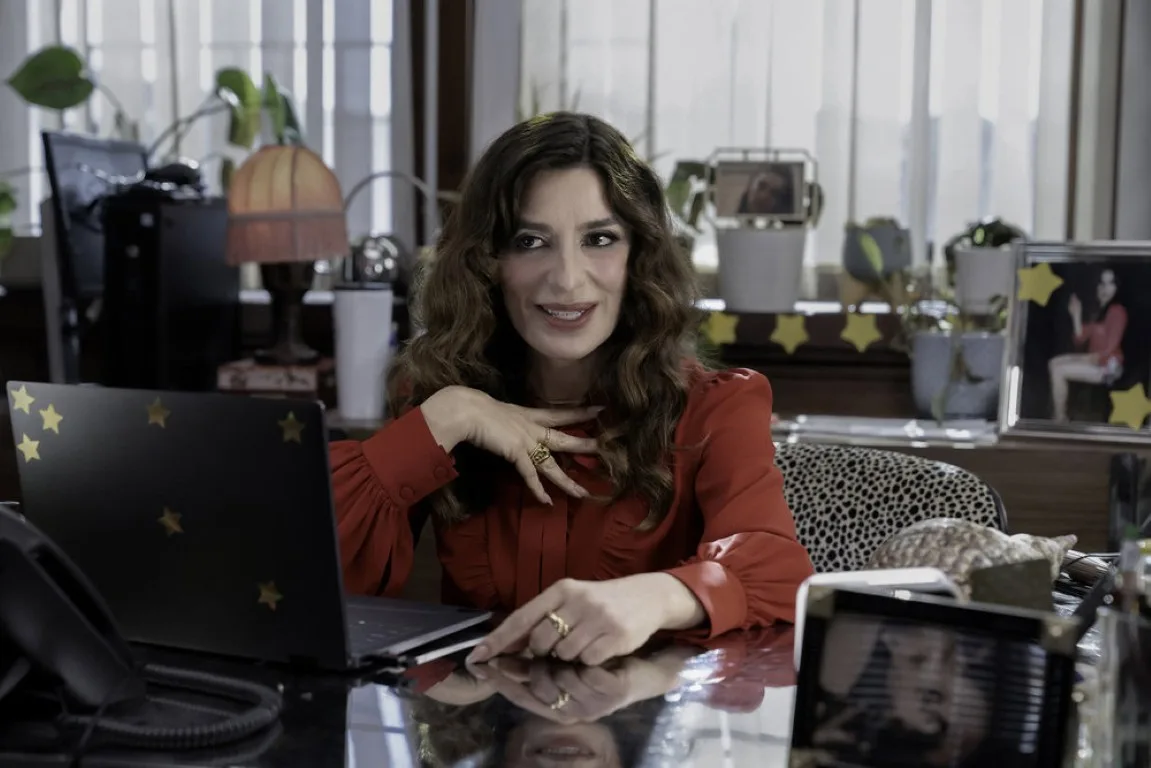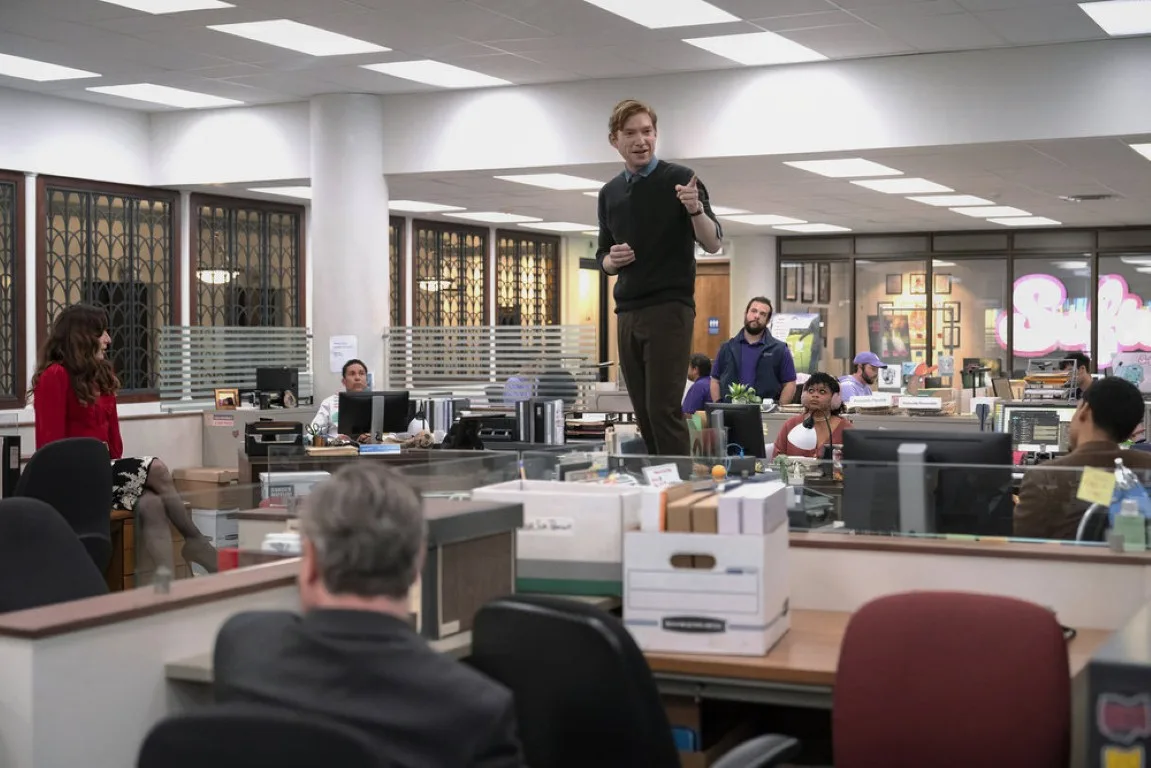The new editor-in-chief of the Toledo Truth Teller is up against it.
He is in charge of a Midwestern newspaper that once employed hundreds of reporters, broke important stories, and had their own printing presses rumbling in the basement of the stately building bearing its name—but this paper is now on life support, woefully understaffed, subscribing to wire services for the bulk of its content, and sharing floor space with a toilet paper company.
That could be the premise for a depressing documentary about the state of print journalism in the 2020s—but Peacock’s mockumentary series “The Paper” is a smart, breezy, good-natured sitcom, and something of a love letter to the noblest aspects of the profession. There’s crisp writing and a likable cast led by an earnest performance from the versatile Domhnall Gleeson as Ned Sampson, the man brought in to save the Toledo Truth Teller. The series exists within the same universe as “The Office,” and successfully mirrors much of that series’ framework. Multiple camera crews lurk around corners and try to be unobtrusive as they film through window blinds and from a distance; a workplace setting featuring a group consisting mostly of malcontents who have no idea how funny they are; the straight-to-camera, talking head “confessionals”; and sly, sometimes biting commentary about the nature of a business that presses on against all odds.
Even when the satire veers into broader territory, there was nary an episode where this 37-year newspaper veteran (who recently took a buyout) didn’t recognize essential truths—some flat-out funny, some lovely and inspirational, some sobering and melancholic.

One of the great things about “The Office” was how it leaned into its conceit, all the way to the release of the documentary-within-the mockumentary series “The Office: An American Workplace.” (I loved “Modern Family,” but it never fully embraced the mockumentary format.). “The Paper” displays that same level of commitment, with the entire cast impressively mastering the technique that occasionally has them acknowledging they’re being filmed; in fact, the subjects here display even more awareness of the cameras than their Dunder Mifflin predecessors. As for that crew, we’re told it’s actually the same team that followed the employees of Dunder Mifflin for nearly a decade. Their new assignment: chronicling life (or should we say life support) at the Toledo Truth Teller, a small subsidiary of a conglomerate called Enervate.
As the smarmy company British business strategist Ken Davies (a deadpan funny Tim Key) explains it, they sell all things paper: “That might be office supplies, that might be janitorial paper, which is toilet tissue, toilet seat protectors, and local newspapers. And that is in order of quality.” The skeletal staff at the Truth Teller has been going through the motions under the scattershot “guidance” of the theatrically self-involved managing editor Esmerelda Grand (Sabrina Impacciatore, in a big swing of a performance that clicks about half the time)—but here comes Gleeson’s newly crowned, and comically inexperienced, editor-in-chief Ned Sampson to save the day. Or collapse from agita trying.
“When I was a kid, I didn’t want to be Superman, I wanted to be Clark Kent,” the overeager Ned tells the doc crew on his first day. (The Dublin-born Gleeson slips into a spot-on Midwest accent that never sounds over-modulated.)

The Truth Teller has only a handful of staffers with reporting experience, including Mare (Chelsea Frei in a star-making turn), a former M1 armored vehicle crew member who wrote for the military paper Stars and Stripes, and Barry (the always terrific Duane R. Shepard Sr.), a Stanley Hudson-esque curmudgeon who has been at the paper since the 1970s and has pretty much checked out. And hey, look over there! Tucked away at a corner desk is the wonderful Oscar Nuñez, reprising his “Office” role as Oscar Martinez, who is now head accountant for Enervate. When Oscar sees the doc crew approaching, he exclaims, “I’m not agreeing to any of this!”—but it turns out the release he signed in 2005 has no end date. Poor Oscar.
Ned’s gung-ho enthusiasm, albeit infused with more than a bit of desperation, is infectious as he tries to whip up excitement and drive in the newsroom. With Gbemisola Ikumelo, Melvin Gregg, and Ramona Young providing steady laughs as Truth Teller and/or Softee’s Tissue staffers who volunteer to be reporters for a couple of hours here and there, “The Paper” settles into the familiar, effective sitcom pattern of single-episode, punchline-packed plots threaded with ongoing storylines about the leading players. (Ned practically ties himself into a pretzel, ensuring that every employee is seen and nobody is offended.) There’s a lot of cringe-humor, and much of it lands, though a few episodes contain some forced and superfluous developments. The scripts are also laced with cynical but often painfully accurate depictions of certain kinds of modern-day journalistic practices that might have been frowned upon in the past, and we’ll leave it at that.
Gleeson is the undisputed star of the show, but workplace comedies are only as good as the team, and “The Paper” has a talent-laden roster, with nearly a dozen characters worthy of our interest. The stellar starting lineup plus the deep bench—that’s the key to keeping us invested episode after episode, perhaps even season after season. For all its cynicism and darkly comedic humor about its subject, the show shares much of Ned’s passion for ink-stained journalism. From time to time, we catch glimpses of a 1971, black-and-white documentary about the Toledo Truth Teller, where the publisher (played by an iconic American writer and actor) beams with pride about the important work done by the hundreds of reporters, saying. “We only keep democracy, is all.” How can we not root for Ned Sampson and his merry band to keep fighting that good fight?
Full season screened for review. All episodes premiere on Peacock September 4th.












